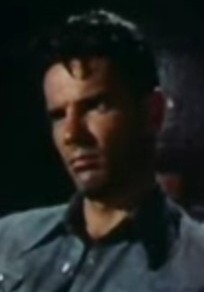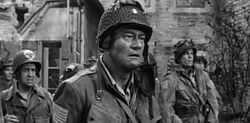Tom Tryon
Tom Tryon | |
|---|---|
 From the film trailer for The Unholy Wife (1957) | |
| Born | Thomas Tryon January 14, 1926 Hartford, Connecticut, U.S. |
| Died | September 4, 1991 (aged 65) Los Angeles, California, U.S. |
| Occupation(s) | • Actor • Writer |
| Years active | 1955–1991 |
| Spouse | Ann Noyes (1955–1958, divorced)[1] |
| Partner(s) | • Clive Clerk (1970s)[2] • Calvin Culver[3] |
Thomas "Tom" Tryon (January 14, 1926 – September 4, 1991) was an American film and television actor, best known for playing the title role in the film The Cardinal (1963), featured roles in the war films The Longest Day and In Harm's Way and as the Walt Disney television character Texas John Slaughter (1958–1961). He later turned to the writing of prose fiction and screenplays, and wrote several science fiction, horror and mystery novels.
Early life and education
Thomas Tryon was born on January 14, 1926, in Hartford, Connecticut, as the son of Arthur Lane Tryon, a clothier[1][4] and owner of Stackpole, Moore & Tryon. (He is often erroneously identified as the son of silent screen actor Glenn Tryon.)
He served in the United States Navy in the Pacific from 1943–1946[4] during and after World War II. Upon return from the U.S. Navy he attended and graduated from Yale.
Career
Acting career
Tryon then studied acting at NYC's Neighborhood Playhouse under the tutelage of Sanford Meisner. He appeared in the 1952 original Broadway production of Wish You Were Here, a long-running musical that starred Jack Cassidy, Patricia Marand and Sheila Bond.
He guest starred in 1955 as Antoine De More in the two-part episode "King of the Dakotas" of NBC's western anthology series Frontier. Tryon appeared in the lead in "The Mark Hanford Story" (February 26, 1958) on NBC's Wagon Train. He portrayed an educated half-breed outraged at his father, Jack Hanford (played by Onslow Stevens), for having mistreated Mark's Cheyenne mother. Kathleen Crowley portrayed Ann Jamison, a young woman that the senior Hanford plans to marry after the self-banishment and then suicide of Mark's mother.[5]
Tryon's other television roles included that of Texas John Slaughter, a part of ABC's Walt Disney Presents in the late 1950s. The role was based on actual historical figure John Slaughter. Tryon also had guest appearances on NBC's The Restless Gun (as "Sheriff Billy"), The Virginian and ABC's The Big Valley (as "Scott Breckenridge") in the April 13, 1966 episode entitled ("The Midas Man"). He was part of a live television performance of The Fall of the House of Usher. He also co-wrote a song, "I Wish I Was," which appeared on an obscure record by Dick Kallman, star of the short-lived and now largely forgotten 1965 television sitcom, Hank. He appeared in the 1967 episode "Charade of Justice" of NBC's western series The Road West starring Barry Sullivan.
Tryon's film career began with Michael Curtiz directing him in a starring role in 1956's The Scarlet Hour, a crime drama about a man whose married lover persuades him to commit a robbery.
Future roles included comic horror and science fiction films, most notably I Married a Monster from Outer Space (1958) and the Walt Disney romantic comedy film, Moon Pilot (1962). He also appeared in Westerns, including Three Violent People (1956), with Charlton Heston and The Glory Guys (1965), as well as a made-for-TV remake of Winchester '73 in 1967.
In 1962, he was cast to play the role of Stephen Burkett ("Adam") in the unfinished Marilyn Monroe-Dean Martin comedy film, Something's Got to Give, directed by George Cukor, but lost that role after Monroe was fired from the movie. He was also considered but eventually passed over for the role of Janet Leigh's lover, Sam Loomis, in the classic thriller, Psycho (1960).
Tryon's greatest role was as an ambitious Catholic priest in The Cardinal (1963), for which he received a nomination for a Golden Globe Award for Best Actor – Motion Picture Drama. However, that honor barely compensated for the trauma and abuse he suffered at the hands of director Otto Preminger. At one point during filming, Preminger fired Tryon in front of his parents when they visited the set, then rehired him after being satisfied that Tryon had been sufficiently humiliated.[6]
Tryon also appeared in two epic films about World War II, The Longest Day (1962) and In Harm's Way (1965).

Writing career
Disillusioned with acting, Tryon retired from the profession in 1969 and began writing horror and mystery novels. He was successful, overcoming skepticism about a classically handsome movie star suddenly turning novelist. His best-known work is The Other (1971), about a boy whose evil twin brother may or may not be responsible for a series of deaths in a small rural community in the 1930s. He adapted his novel into a film released the following year, which starred Diana Muldaur, Uta Hagen, and John Ritter.
Harvest Home (1973), about the dark pagan rituals being practiced in a small New England town, was adapted as The Dark Secret of Harvest Home (1978), a television mini-series starring Bette Davis. An extensive critical analysis of Tryon's horror novels can be found in S. T. Joshi's book The Modern Weird Tale (2001).
His other books include Crowned Heads, a collection of novellas inspired by the legends of Hollywood. The first of these novellas, Fedora, about a reclusive former film actress whose relationship with her plastic surgeon is similar to that between a drug addict and her pusher, was later converted to a feature film directed by Billy Wilder. Though the film was only moderately successful, it is considered by many[who?] to be a minor classic of the thriller and horror genres.
Other novellas in the collection were based on the murder of former silent screen star Ramón Novarro, and the quasi-Oedipal relationship between actor Clifton Webb and his mother. Lady (1974) concerns the friendship between an eight-year-old boy and a charming widow in 1930s New England and the secret he discovers about her. Many[who?] consider this to be Tryon's best work. His novel The Night of the Moonbow (1989) tells the story of a boy driven to violent means by the constant harassment he receives at a summer boys camp. Night Magic, written in 1991, was posthumously published in 1995.
Personal life
Tryon married, in 1955, Ann L. Noyes, the daughter of stockbroker Joseph Leo Lilienthal and his wife, the former Edna Arnstein. She was the former wife of Thomas Ewing Noyes, with whom she had been a theatrical producer.[7][8][9] The Tryons divorced in 1958,[1] and Ann Tryon resumed her previous married name, dying as Ann L. Noyes in 1966.[1][10]
During the 1970s, he was in a romantic relationship with Clive Clerk, one of the original cast members of A Chorus Line and an interior designer who decorated Tryon's apartment on Central Park West in New York City, which was featured in Architectural Digest.[2]
Tryon was also involved in a relationship with Calvin Culver, also known as Casey Donovan, a gay porn star.[3]
He reportedly spoke of an unseen lover throughout his life, a lover he had dubbed "Patrick Norton." This Patrick resided in the dreams and imagination of Tryon and is the basis for many of his characters (all of whom, notably, die horrific deaths). [11]
Death
Tryon died of stomach cancer on September 4, 1991, at the age of 65, in Los Angeles, California. [12]
Selected works as writer
Novels
|
CollectionsShort stories and novellas
|
Filmography and television work
- The Scarlet Hour (1956) as E.V. 'Marsh' Marshall
- Screaming Eagles (1956) as Pvt. Mason
- Three Violent People (1956) as Beauregard 'Cinch' Saunders
- The Unholy Wife (1957) as San Sanders
- I Married a Monster from Outer Space (1958) as Bill Farrell
- Gundown at Sandoval (1959) as Texas John Slaughter
- The Story of Ruth (1960) as Mahlon
- Marines, Let's Go (1961) as Pfc. Skip Roth
- Moon Pilot (1962) as Capt. Richmond Talbot
- The Longest Day (1962) as Lieutenant Wilson
- Something's Got to Give (1962) as Stephen Burkett
- The Cardinal (1963) as Stephen Fermoyle
- In Harm's Way (1965) as Lieutenant William 'Mac' McConnel
- The Glory Guys (1965) as Capt. Demas Harrod
- Persecución hasta Valencia (a.k.a. The Narco Men, 1970) as Harry Bell
- Color Me Dead (1969) as Frank Bigelow
- Johnny Got His Gun (1971) (uncredited)
- The Horsemen (1971) (uncredited, Last appearance)
References
- ^ a b c d "Tom Tryon". Turner Classic Movies. n.d. Retrieved December 21, 2010.
- ^ a b Tom Tryon at IMDb
- ^ a b Edmonson, Roger (1998). Boy in the Sand — Casey Donovan, All-American Sex Star. Los Angeles, California: Alyson Books. p. 144. ISBN 978-1-555-83457-9.
- ^ a b "Tom Tryon-Biography". Rotten Tomatoes. Retrieved 21 December 2010.
- ^ Wagon Train episode "The Mark Hanford Story" at IMDb
- ^ Fujiwara, Chris (2008). The World and Its Double — The Life and Work of Otto Preminger. New York City, New York: Faber and Faber. p. 302. ISBN 978-0-571-21117-3.
- ^ Thomas Ewing Noyes, 1922-1997, was a son of American journalist Newbold Noyes and a grandson of Frank Brett Noyes, a president of Associated Press. He later became a commentator on National Public Radio.
- ^ Everett Aaker, Television Western Players of the Fifties (McFarland, 1997), page 506
- ^ "Miss Lilienthal, Pensacola Bride", The New York Times, 20 December 1944
- ^ "Noyes, Ann L.", The New York Times, 24 November 1966
- ^ Quirk, Lawrence J; Schoell, William (2002). Joan Crawford — The Essential Biography. Lexington, Kentucky: University Press of Kentucky. p. 247. ISBN 978-0-813-12254-0.
- ^ "Author, actor Thomas Tryon dies of stomach cancer". Boca Raton News. Boca Raton, Florida. Associated Press. September 5, 1991. p. 4A. Retrieved April 21, 2016.
External links
- Tom Tryon at AllMovie
- Tom Tryon at IMDb
- Tom Tryon at the TCM Movie Database
- Tom Tryon at the Internet Speculative Fiction Database
- Articles with specifically marked weasel-worded phrases from July 2009
- 1926 births
- 1991 deaths
- 20th-century American male actors
- 20th-century American novelists
- Male actors from New York
- American male film actors
- American horror writers
- American male novelists
- American military personnel of World War II
- American LGBT military personnel
- American mystery writers
- American science fiction writers
- American male screenwriters
- American male stage actors
- American male television actors
- Deaths from cancer in California
- Deaths from stomach cancer
- Gay actors
- Gay writers
- LGBT entertainers from the United States
- LGBT writers from the United States
- LGBT novelists
- Male actors from Hartford, Connecticut
- People from Manhattan
- Writers from Hartford, Connecticut
- Writers from New York
